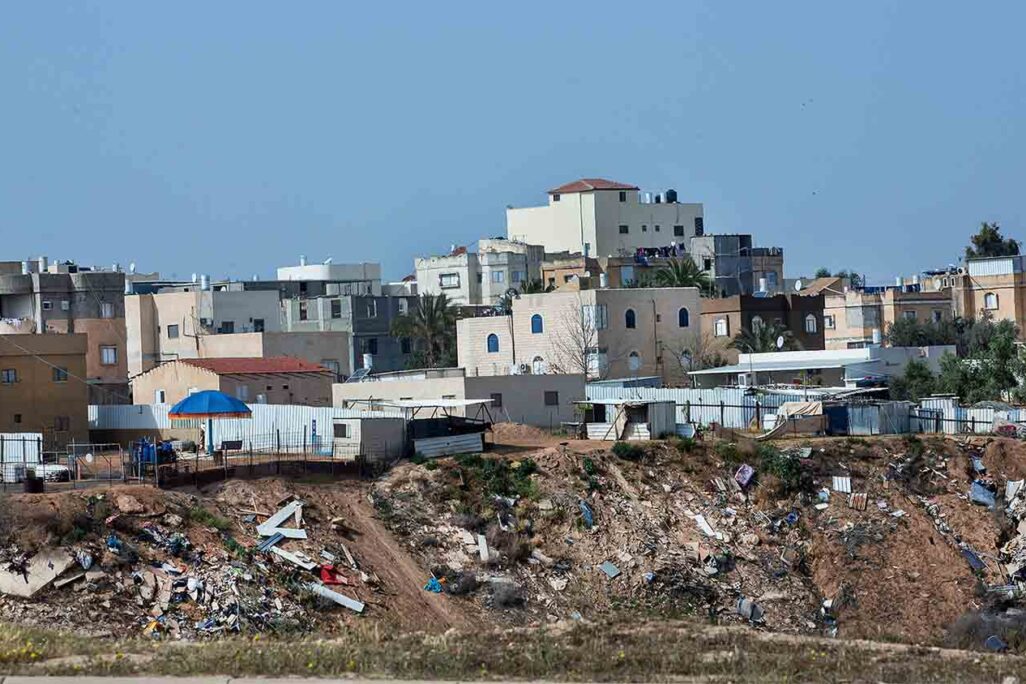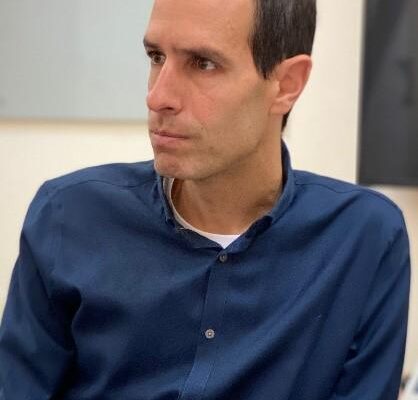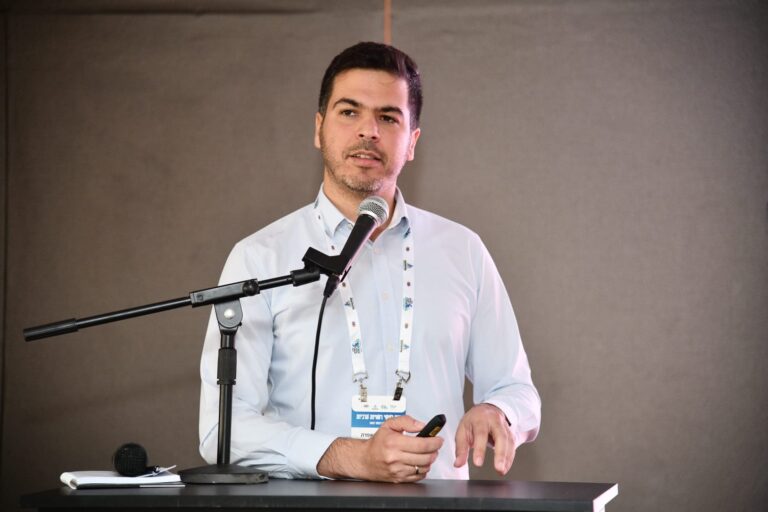
The Knesset’s approval of the 2023-2024 state budget earlier this year means that the government will continue to implement Resolution 550, also known as the Takadum plan. Under the plan, which is named after the Arabic word for progress, the government will transfer tens of billions of shekels directly to the Arab community. Davar spoke to representatives from the Ministry for Social Equality about an underlooked part of the plan — a program to increase the availability of credit in Arab Israeli society.
“The government has made great strides in terms of responsibility for Arab society, but it’s a triangle,” Meir Bing, director general of the Ministry for Social Equality told Davar. “We’re dealing with the crime side and we’re dealing with the socioeconomic situation. But we haven’t taken care of the credit side. Lack of credit fuels crime and suppresses economic growth.”

“Underlying the government's resolution 550 is a concept of reducing gaps between Jews and Arabs in all areas of life,” Hasan Tawafra, head of the Authority for Economic Development of Arab Society, told Davar. “When we reviewed the areas that need to be addressed, we found that the credit issue is in all of them.”
“In order to take care of credit, you have to shut down the illegal sources of credit and open a legal one. Today the state is trying to open the legal sources. The state has worked to shut down the illegal sources but the reality is still whoever needs the money, will find another road,” Tawafra said.
A program for state-guaranteed loans meant to address the credit problem was rejected by the Ministry of Finance, on the grounds that the cost was too high. The Ministry for Social Equality hopes to start a pilot program in the meantime to start dealing with the issue.
"If credit is not accessible, people find a way"
Lack of credit in Arab Israeli society holds the entire community back, Tawafra explained. “Every year, 12,000 couples in the Arab sector get married. They all need a place to live, and for most of them, credit for an apartment is not an accessible option,” he said. “The percentage of Arabs among mortgage recipients is 2%, significantly lower than their share in the population. So some of them live with their parents.”
Those who do manage to access credit are often burdened with high interest rates.
“There is no exact figure on this, but there are many who break pensions or long-term savings. Some take out very expensive loans from banks, and some turn to the black market. Even within the black market there are different shades. There is a gray market with high interest rates that maybe your house isn’t going to get shot at, but it comes at the cost of crazy interest rates of 10% a month,” Tawafra said.
Tawafra attributed the mortgage gap between Jewish and Arab society to the way much land in Arab society is registered.
“In order to take out a mortgage, you have to register collateral, that is, pledge the house to the bank,” he explained. “Usually in Arab society, the collateral is unregistered. At the beginning, during the mandate days, many plots were registered to one person. You can build completely legally with permission from the owner of the land. But when you come to take out a mortgage, the land needs to be specifically registered in the applicant's name. There are large registration gaps. There are lots of unregulated blocks and plots. You need parceling (a procedure of consolidating and dividing the land in order to register it in an orderly manner) and it takes years.”
He pointed to an example in the Arab city of Maghar in northern Israel to show how difficult in can be to parcel land and actually create smaller units of land registered to the government.
“For example, there is an area in Maghar where 150 people live. If you want to make a parcel, it is enough for one of them to have a case in execution or a consolidation case, and it would not be possible to register the land. Even if the registration problem is solved, the bank says that the collateral is not negotiable. Who will buy a house In the middle of a family plot? This is a market failure that the state needs to address. This is one of the reasons for the massive move to mixed cities,” Tawafra said.
The solution: state-backed loans
Since the passage of a previous plan to help economically develop Arab Israeli society in 2017, it has been clear that access to credit is a serious problem. Former Director General of the Ministry for Social Equality Yael Mevorach headed a team to develop recommendations for improving credit access, but the Treasury objected to the inclusion of those recommendations in Resolution 550.
“The recommendations were to accelerate the registration processes and to improve the real estate market. In the first stage it’s state-backing for loans, and then the state will slowly withdraw from the market. We believe that the state will be able to exit when the confidence of the banks in the market is built,” Tawafra said.
The recommendations included in Resolution 550 were similar to the ones originally proposed by Mevorach’s team.

“The state tells the bank: if you have exhausted the entire process and reached the stage where you were unable to get the collateral, the state will guarantee it,” Tawafra said. “Not fully for 100% of the loan, but partially. We are not saying to give money to those who don’t have it. For those who have the ability to take out a mortgage, and the problem is the collateral, the state will provide a guarantee, but only in the case of a default. If you check those who take out mortgages, there is no excess default rate among Arabs.”
The Treasury and the Ministry of Finance are concerned about loss of state credit and the potential to encourage banks to make riskier loans. The Bank of Israel, on the other hand, supports the plan as an initiative that could increase the stability of Israeli banks by having the state take on more risk.
Tawafra made clear that the plan would not have banks give out riskier loans. “The goal is to divide the risk between the state and the bank. Our goal is for the bank to continue its risk assessment,” he said.
General Accountant of the Ministry of Finance Yali Rothenberg has said that he recognizes the importance of the program, but cautioned that the state will only back up mortgages after the land registration process has been exhausted, which can take years.
“We need to increase land registration, but we want to start the process now,” Bing, the director general of the Ministry for Social Equality said. “We will choose an area where the registration situation is better, determine a total amount for the guarantee and create a test case. What is critical for us is a gradual implementation in a certain area, with a specified amount. At the same time, we will do the rest of the steps.”
Dramatic underrepresentation in banking
Access to credit in Arab Israeli society is also affected by lack of financial literacy, lack of access to banks, and an absence of Arabic-speaking mortgage advisors.
“There is a dramatic underrepresentation of Arabs in banking,” Bing said. “The number of branches in Arab society is low. It is indeed growing, but it’s still not in a good place. On top of that, there are no Arab mortgage consultants. They need to be developed. There are many problems.”
The credit crunch also limits the development of Arab towns and cities.
“When there is no credit, there is no construction for height,” Tawafra said. “If there is a registered plot, you can build up to two stories. A three-story building is considered a business and requires higher amounts [of credit.]”
“The market in Arab society is very different,” he explained. “These are private lands. When you want to divide the land between the owners, it is not fair to take all the public lands from one of the owners. For that, you have to move his plot here or there. People don't understand that. It's not easy to do that. Until now, the state has done it without public [support.]”
Tawafra pointed to former Deputy State Attorney Erez Kaminitz as a figure who tried to increase public participation in the parcelling process, which, he said, was successful in the Arab town of Majd al-Krum in northern Israel.
The lack of credit also affects the Arab sector’s ability to open and maintain businesses. “A business will not develop without credit,” Tawafra said. “These are mostly family businesses. Sometimes there are poor credit reports. Management tools need to be given. The authority also needs to lend out money to develop the [area]. There were complaints that the Ministry of the Interior does not approve enough loan requests. In Resolution 550, we demanded to create a route that would allow the provision of credit.”
While most people agree that the Arab towns and cities need to be developed, the local authorities have been criticized for mishandling funds, including accusations of corruption and money laundering.
“There is a problem with the local authorities,” Bing said. “The weak authorities really do not function well, and there is a presence of clans and criminal organizations. In the decision we wanted to provide a product to the residents. The roads are built by the Ayalon Roads [government company]. Some things are done through the authorities and some are not.”
While bypassing the local authorities might reduce corruption, it also may end up weakening the local authorities even more.
“There is tension, but at the same time the authorities are being strengthened. On the one hand, they are being bypassed, and on the other hand, they are being strengthened,” Bing said. “We recruited quality personnel for the authorities and trained them. The authorities are fighting for this. These are the people who respond to the requests for proposals. The Arab authorities didn’t know how to respond to the requests for proposals. Any budgetary additions just flowed to the powerful.”
“There has been success,” he continued. “This year for the first time there was a moderate response to the call for the establishment of day care centers, and a high response to the establishment of industrial zones. Another step is to strengthen the engineering departments … There’s a contradiction, but you can’t give money to a weak authority. It won’t know what to do with it.”
Tawafra called on the government to work to strengthen weaker local authorities and let strong authorities make decisions by themselves.
“I hope that now after the elections we will return to work in a meaningful way,” Bing said. “The government did not make a different decision, so the plan continues. Fifteen billion shekels for the ministries are in the budget. Regarding the additional amount of 15 billion, plans need to be submitted and approved.”
“The program is successful,” he said. “It is of course affected by the political changes, the pace slowed down a bit, but in the end the execution was very good. The scope of the expenditure is 5 billion shekels, most of it in commitments, out of the 6 billion shekels budgeted. Usually the first year is difficult, but the achievements are extraordinary. Compared to the first year, this is an extraordinary success.”
This article was translated from Hebrew by Matt Levy.






